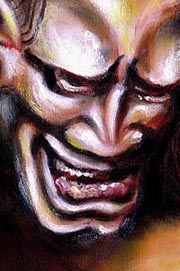About > Press >
Author of "Medusa's Myths"
Finding Hiroko Sakai was an accident, if you consider fate an accident. I was on a quest for an image I could so clearly see in my mind’s eye, yet lacked the talent to produce on my own. I wanted a portrait of Medusa that fully captured her essence. I didn’t want the typical, one-dimensional view of Medusa as the monster. The whimsical image of Medusa, though amusing, lacked the depth I sought. What I longed for was beauty intermingled with terror; power tempered with vulnerability; something fantastic to become real. What I found was “Medusa #2,” a painting that exceeded my expectations. However, this painting became more than a mere picture for me to gaze upon; it became the portal to the world of Hiroko Sakai.
Exploring Ms. Sakai’s world was like walking through a lucid dream. For some of these paintings, it is obvious that the subjects originate from a different plane. “Yume_Dream,” where fish are leaping beyond the framed image of a pond, outright declares its status as an otherworldly image. Many of Ms. Sakai’s works also have surrealistic elements to them, like the disembodied eyes in “Maze” or “Lovers.” Also in “Lovers,” many other incongruous elements are added, such as the distorted clock resting next to a snake. Other paintings are less obvious. In “Slough,” we see a tiger skin spread out on a barb wire fence, and beyond, a city. This painting is just unusual enough that we could assume that it was a dream, yet realistic enough that we could imagine actually coming upon such a scene in the solid world. “Moon,” the image of a Japanese woman looking out a window into the night, surely could be considered realistic. Yet this subject is given the same ethereal treatment that most of Ms. Sakai’s paintings are given. Set on a darkened canvas, bold colors are layered with bright accents, as if Ms. Sakai brought the image out from the shadows and shined a light on it. If this scene is not a dream, it is certainly dream-like.
However, not all dreams are pleasant, and Ms. Sakai does not flinch from showing us the entire range of the human emotion. “Hannya,” the nude figure with a demonic head, is no doubt the stuff of nightmares, and evokes a sense of rage, lust, and jealousy in the viewer. On the other end of the spectrum,  “A Door Forgotten” shows feathers falling from a portal of light above a field of sunflowers, as if some angelic creature found escape from the material world. However, Ms. Sakai is not purely an extremist. She shows the humorous in paintings like “Modern Romance,” where a couple sitting side by side lust after actors and actresses on their TV. She illustrates the mystical in “Riberation,” the image of a dark face with an open third eye. In “Power of Spirit,” a dragon springs out from a stone as the carver chisels, inspiring the viewer.
“A Door Forgotten” shows feathers falling from a portal of light above a field of sunflowers, as if some angelic creature found escape from the material world. However, Ms. Sakai is not purely an extremist. She shows the humorous in paintings like “Modern Romance,” where a couple sitting side by side lust after actors and actresses on their TV. She illustrates the mystical in “Riberation,” the image of a dark face with an open third eye. In “Power of Spirit,” a dragon springs out from a stone as the carver chisels, inspiring the viewer.
Like in a lucid dream, how much the viewer participates with Ms. Sakai’s work up to the person. If one simply wished to observe, Ms. Sakai’s vivid palette and tangible texture is quite pleasing to the eye on its own. However, while Ms. Sakai presents her ideas to her audience, her composition allows each viewer to draw their own conclusions. Ms. Sakai’s work is less a declaration of her beliefs, and more an invitation to conversation. I cannot emphasize enough how pleased I am to have entered into Hiroko Sakai’s world, and I look forward to seeing its expansion.